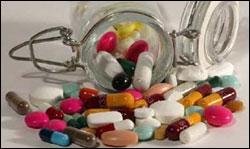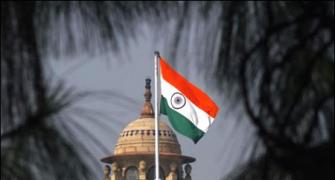For those who say India is a country of generic drugs, this could be a revelation. India granted as many as 3,488 patents to pharmaceutical products between 2005 and 2010.
 Compare India's pharma patent number with that of Brazil, another BRIC (Brazil, Russia, India and China) nation, in a similar time band. A research paper, "Pharmaceutical Innovation, Incremental patenting and Compulsory Licensing" by Carlos M Correa, a professor at University of Buenos Aires, points out that just 278 patents were granted in Brazil between 2003 and 2008.
Compare India's pharma patent number with that of Brazil, another BRIC (Brazil, Russia, India and China) nation, in a similar time band. A research paper, "Pharmaceutical Innovation, Incremental patenting and Compulsory Licensing" by Carlos M Correa, a professor at University of Buenos Aires, points out that just 278 patents were granted in Brazil between 2003 and 2008.
According to the same paper, 951 pharma patents were granted in Argentina between 2000 and 2007; and 439 were approved in Colombia between 2004 and 2008. However, in South Africa, where patents are simply registered without much verifications and patentability requirements, 1,426 were registered in 2008 alone, the paper added.
While data reveals patentability has encouraged local drug innovation in India, experts suggest the country needs stricter checks and balances to prevent incremental innovation.
It was in 2005, India changed its patent law and started granting patents in medicines. That year, only three pharma patents were granted. The number rose to 113 in 2006 and 772 in 2007. The trend continued with as many as 1,369 patents being approved in pharma in 2008 and 1,046 in 2009, as per the Indian patent office.
Experts attribute this significant change in the patent regime to entry of product patents. According to an intellectual property right (IPR) lawyer, India granted as many as 970 pharmaceutical product patents between 2007 and 2011.
In 1994, India, along with various other developing countries, signed the World Trade Organisation's (WTO) agreement on Trade Related Aspects of Intellectual Property Rights (TRIPS) which mandated it to start granting patents on medicines no later than 2005. Unlike many countries, India used the transitional period provided in the agreement to the full. It changed its patent law only in 2005 to comply with the TRIPS agreement and started granting patents to drugs.
The change in the intellectual property scenario has also triggered significant shifts in India, particularly in the pharma sector. While research and development activities have substantially increased with various domestic companies investing to develop new chemical entities, Correa points out the large number of grants can only be explained by patents over incremental innovations.
The concerns, therefore, have also raised debates on interpretation of provisions like section 3 (d) of the Indian Patent Act which prevents patenting of frivolous and incremental innovations. An current case in the Supreme Court, between Swiss drug maker Novartis and the government along with a host of generic drug makers, is revolving around interpretation of this provision.
"Though India has introduced the provision of section 3 (d) in its patent law, it has not been implemented uniformly, which is important," says Leena Menghaney, campaign co-ordinator (India), Medecins Sans Frontieres, which campaign for access to essential medicines across the world. Agrees Amit Sengupta, the co-convenor of Jan Swasthya Abhiyan, a public health advocacy movement.
According to Sengupta, it is not enough to have section 3 (d) theoretically, implementation of the provision is important which will happen only through proper examination of grants.
More recently, the government granted compulsory licence to domestic drug maker Natco allowing it to manufacture the generic version of Bayer's anti-cancer drug Nexavar, even as the latter has a patent on it. The move is aimed at safeguarding public interest as Nexavar is an expensive drug.
Experts say pharmaceutical companies in India need to be IP conscious. "The pharma industry is going to be affected in the next 15-20 years due to IP issues. Therefore, the companies need to be IP conscious now," says Prathiba M Singh, patent and trade mark attorney and managing partner of Singh & Singh Law firm.










